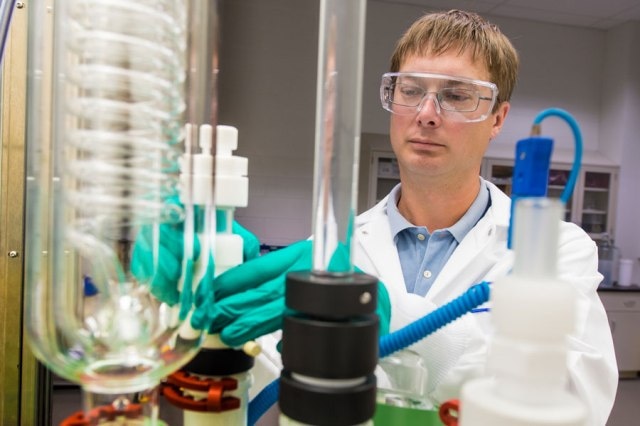Jul 11 2016
Next-generation materials capable of enhancing energy storage are being developed by the U.S. Department of Energy's (DOE's) Argonne National Laboratory in partnership with Strem Chemicals, Inc for the battery research community and industry.
 Chemist Trevor Dzwiniel develops processes for scaling up production of an electrolyte material for batteries in the Materials Engineering Research Facility at Argonne National Laboratory. Argonne is teaming up with Strem Chemicals, Inc., to provide industry and the battery research community with next-generation materials that could improve energy storage. (Photo credit: Wes Agresta)
Chemist Trevor Dzwiniel develops processes for scaling up production of an electrolyte material for batteries in the Materials Engineering Research Facility at Argonne National Laboratory. Argonne is teaming up with Strem Chemicals, Inc., to provide industry and the battery research community with next-generation materials that could improve energy storage. (Photo credit: Wes Agresta)
Strem, founded in 1964, is a manufacturer and distributor of specialty chemicals. It has licensed 23 individual pieces of intellectual property from Argonne and will produce and distribute nine battery solvents and additives through its marketing and worldwide distribution networks.
The unique materials were invented at Argonne's Electrochemical Energy Storage Center. They were later scaled at the laboratory's Materials Engineering Research Facility (MERF). Since its start, MERF has grown and distributed more than 30 kilograms of materials in the form of 150 diverse samples.
We continue to receive requests for samples of materials that we have scaled but have not fully distributed. Partnering with Strem [makes] sense to help make these materials available.
MERF Director Greg Krumdick
MERF was set up as there was a requirement for a facility that could assist in speeding up the transfer process of advanced battery materials from the laboratory to industry.
Although current projects at MERF aim at the development of sophisticated batteries for vehicle and grid storage applications, it is also capable of supporting scale-up projects for all kinds of materials.
Strem has a range of products for energy applications and is pleased to introduce these innovative products from MERF.
Dr. Ephraim Honig, Chief Operating Officer of Strem Chemical
The contract with Strem funds as well as represents successful technology transfer across the research spectrum spanning from invention at the laboratory level to scaling-up for use by industry.
Argonne is able to transfer some technology packages and sample material to Strem because of this partnership, for Strem to plan a way to successfully scale the materials up from one gram batches to kilogram-sized batches in an economical manner.
So far several of these technologies have been manufactured by Strem. Strem plans to start commercial production soon for the rest of the samples. MERF will also offer direction on the synthesis and validation to guarantee that the materials manufactured has both electrochemical performance and chemical purity before distribution.
This agreement helps us get these materials out the door and into the hands of industry and researchers. It takes us one step closer to our final goal: implementation in commercial batteries. Strem will enable the research community to have greater access to these materials.
Krumdick
The DOE Office of Energy Efficiency and Renewable Energy's Vehicle Technologies Office support MERF.